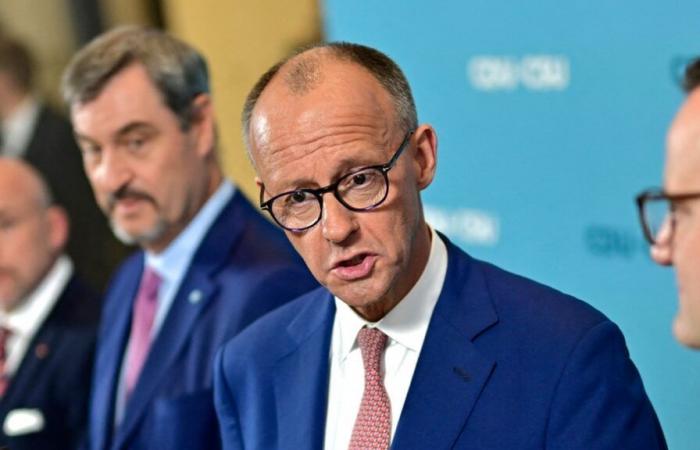The Conservative Friedrich Merz was elected Tuesday in the German Chancellor Pain by the deputies, being forced to do it twice, signs difficulties which await him in power at a time, however a pivotal for his country.
Unprecedented scenario in Germany, it took a second ballot in the Bundestag so that the president of the Christian Democratic Party (CDU) was ultimately barely worn as Head of government.
At the age of 69, after having hardly won the early February legislative elections at the end of February, Merz obtained 325 votes out of 630 deputies, during a second vote organized in the afternoon and made necessary by a failure in a first round in the morning, which created the amazement.
While the secret election of Friedrich Merz presented itself as a simple formality after the conclusion of a majority coalition agreement with the social democrats of the outgoing Chancellor Olaf Scholz, he first failed to reach the necessary threshold.
Never in the history of post-war Germany, a chancellor candidate had known such a fate. In the German parliamentary system, the deputies elected the head of government.
This setback illustrates the fragility of the Christian Democratic leader and the coalition with which he intends to govern the first European economy, in a world in full geopolitical upheaval and under pressure from the Trump administration and on the inner level of an extreme booming right.
Rebellious
Friedrich Merz will therefore start weakening his four -year term, when he was supposed to bring stability after the national political crisis opened by the fall of the Scholz government in November. This draft immediately undermines its promises to revive the country, in economic crisis, and Europe.
Already unusual in opinion, he is challenged in his own conservative ranks for returning to a campaign promise: he recently softened the very strict national rules for budgetary expenditure. The Chancellor did so to be able to finance a vast program of reset of the country, faced with the Russian threat and that of an American military disengagement from the European continent, and modernization of the country, of several hundred billion euros.
This election to forceps is “a camouflet” et “will inevitably have an impact on its beginnings as a chancellor and then on the upcoming government period“, told AFP Claire Demesmay, professor at Sciences Po Paris and associate researcher at the Center Marc Bloch in Berlin.
-“And internationally too, it’s really not a good sign“, She adds, while Friedrich Merz is expected on Wednesday in Paris and Warsaw.
The new Chancellor, who must still be officially invested on Tuesday by the Head of State and take an oath, knew that he would not benefit from any state of grace. But he did not expect this parliamentary humiliation, as his face closed, in the spans of the Assembly, showed him, after the first vote. He missed 18 votes, a sign of his inability to immediately fill up with the votes of the conservatives and the social democrats.
The extreme right in ambush
In ambient chaos, the alternative far right party for Germany (AFD) rubbed hands and immediately called for new elections.
“We are ready to assume government responsibility“Said Alice Weidel, whose movement today exceeds the conservatives in certain polls, after having already obtained 20% in the legislative elections.”You failed, the events of this day are unprecedented in this room“, Echo another AFD official, Bernd Baumann echoed.
These turbulence occur while Germany is at a time of geopolitical rocking, forced to free itself from the military supervision of an American ally which has become unpredictable and to reinvent its economic model.
A supporter of unfailing support to Ukraine, Mr. Merz has promised a new “leadership” in Europe, which involves tightening links with Paris, but also Warsaw.
To cope with the Russian threat, his coalition wants to continue the upgrade of the German army. But also essential infrastructure such as roads and schools, in poor condition after years of underinvestment.
On the inner level again, Friedrich Merz intends to make AFD back down by being hard on immigration. His success in power will also depend on the agreement with the social democratic allies who have obtained key ministries: finances for vice-chancellor Lars Klingbeil and the defense where the outgoing Boris Pistorius remains.
Friedrich Merz Germany Chancellor Politics Europe








